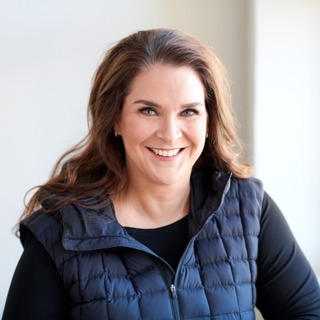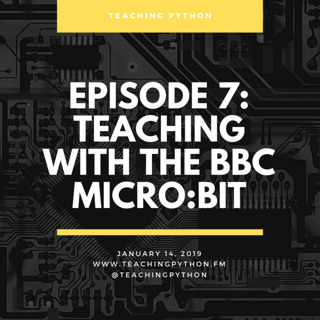
Episode 7: Teaching with the BBC micro:bit
In this week's episode, Kelly and Sean discuss one of the tools that we like to use in class: the BBC micro:bit (https://www.microbit.org). Thanks to the instant feedback and physical/tactile nature of the device, this inexpensive little IoT device makes the process of learning Python more intuitive for students. It's also an easy starting point for those teachers who are new to coding. There are many advantages to using a physical computing device in a school setting and we will walk you through a quick introduction to the micro:bit and our preferred sequence of lessons with Python on this platform. We will also talk about some add-ons that can extend the capabilities of this remarkable little device to allow your students flexibility and creativity with their newfound skills. As with any teaching tool, there are always some best practices to consider to maximise learning and positively impact your students. Kelly and Sean will touch on some tips and tricks to use in your classroom.
15 Tammi 201942min
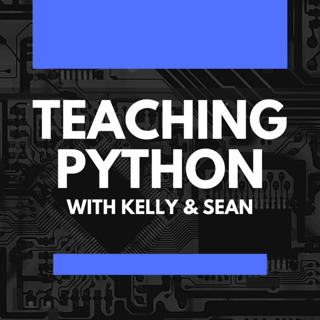
Episode 6: Gaining a Deeper Understanding of Python With Coding Challenges
Kelly and Sean are back this in this week's episode to talk about the role of coding challenges for student understanding. Coding challenges are teacher-defined coding problems that students tackle individually or in groups with more than one possible solution. The advantages of these challenges compared to passive learning include deeper retention of skills and knowledge, opportunities for social and emotional education, and increased student confidence through subject mastery. What are coding challenges? Coding challenges are teacher-defined coding problems that students tackle individually or in groups with more than one possible solution. Challenges are time-bound, i.e. they must be solved within a set period of time and range in complexity from simple code snippets to complete programs. For example: * A 5-minute challenge to add comments to existing code * A 3-day challenge to create a game in Python * A standing challenge to solve a complex math problem by the end of the course
10 Tammi 201937min

Episode 5: Building Resilience
This week, co-hosts Kelly Schuster-Paredes (https://twitter.com/kellypared) and Sean Tibor (https://twitter.com/smtibor) talk about their preferred methods for building student resilience while learning Python. Every learner reaches a point where they may get frustrated, discouraged, or want to give up. How can you help them get past that moment and rebuild momentum? How do you recognize those moments? What can you do as a coach and mentor to help them? What activities help prevent those moments from happening?
31 Joulu 201828min
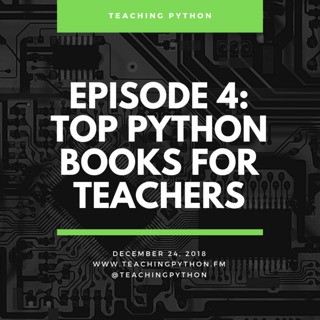
Episode 4: Top Python Books For Teachers
This week, Kelly and Sean review their top Python books for teachers. They cover everything from classics like Automate the Boring Stuff with Python (https://amzn.to/2V7YD47) and Invent Your Own Computer Games (https://amzn.to/2LzsxtS) to the newest books like Impractical Python Projects (https://amzn.to/2EHdpdh) and Coffee Break Python (https://amzn.to/2BwS0PP). If you're looking for a good book for your winter break, there's bound to be one that will suit you here. Brew up a nice cup of tea or coffee and take a paper-based break this week. Your co-hosts this week are middle school computer science teachers Kelly Schuster-Paredes (https://twitter.com/kellypared) and Sean Tibor (https://twitter.com/smtibor). Kelly is an experienced international teacher who's learning coding and Python for the first time. Sean is a technology professional that's teaching middle school for the first time. Each week, they explore resources, approaches, and best practices for teaching Python to beginner students.
24 Joulu 201831min
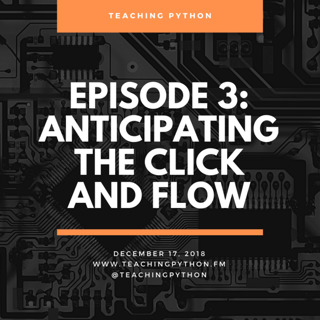
Episode 3: Anticipating the Click and Flow
We've noticed that many of our students have a moment where everything 'clicks' and they make a leap forward in their knowledge of Python. Kelly and Sean discuss strategies to ensure that this happens, including coding challenges, metacognitive discussion, and formative assessments. Flow states are another phenomenon that indicates deep learning and knowledge acquisition. We've defined that as a state of increased productivity, focus, and absorption.
17 Joulu 201834min
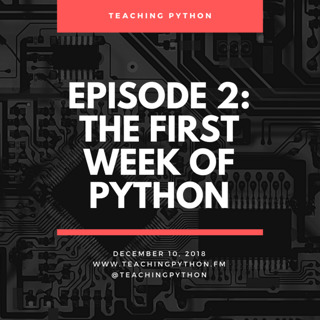
Episode 2: The First Week of Python
What does the first week of Python look like for new coders? Where do you start? Is it better to jump right in or give them a softer start? We'll talk about everything from what exercises work best, how to get new Python coders started with an IDE like Mu Editor, and more. In this episode, Kelly and Sean talk about starting the first week of teaching Python. We take a look why we choose to teach Python in our Computer Science Course. We also give a few tips on how we set expectations, establish routine, develop a coding mindset, and choosing the first tool to use in the first week of teaching a computer class.
10 Joulu 201829min
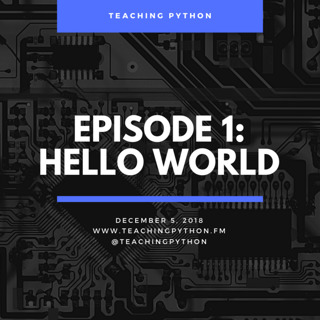
Episode 1: Hello World
5 Joulu 201831min




















